Best Cleaning Methods for Pool Pavers Revealed
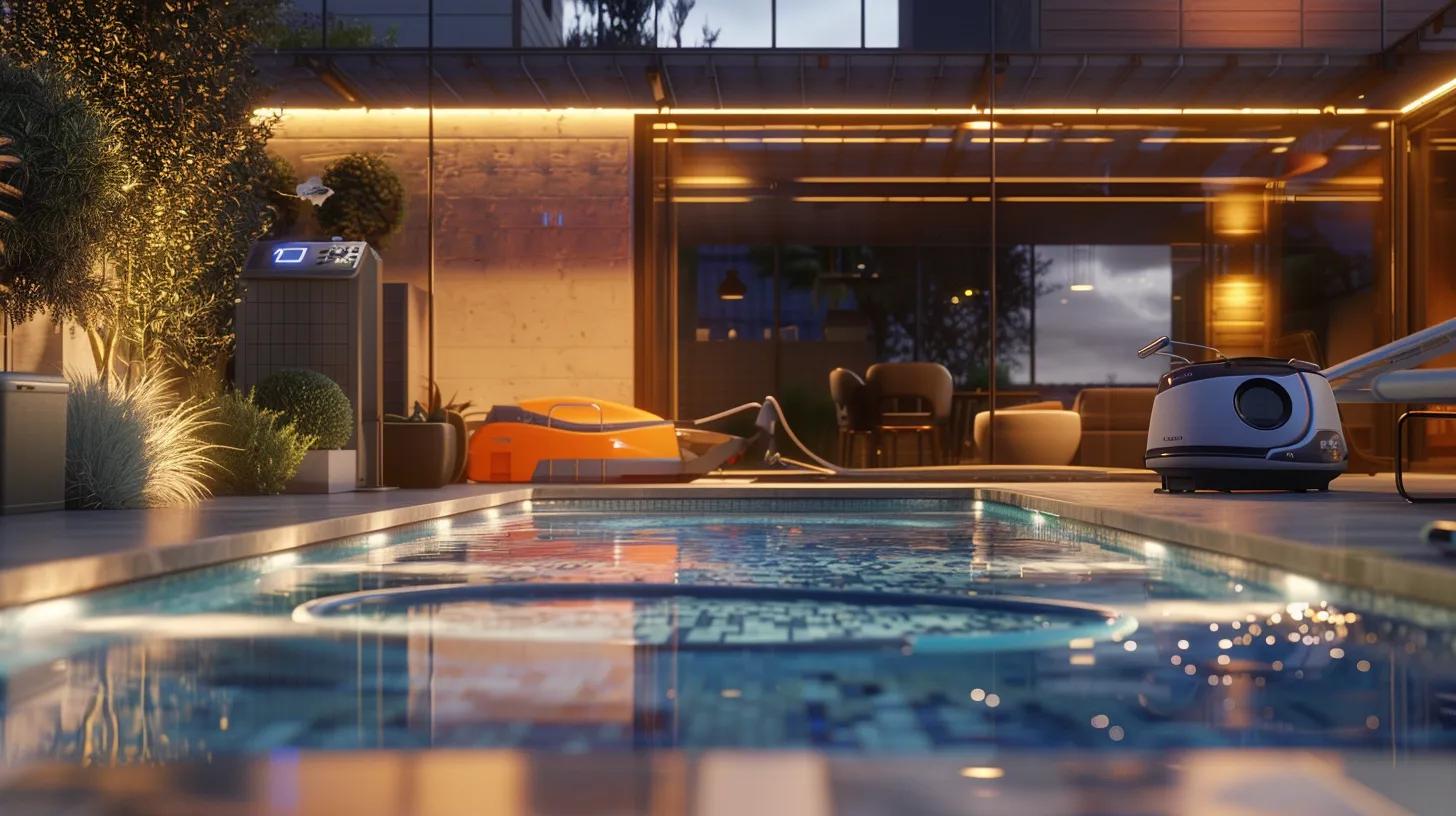
Key Takeaways
- Pool paver cleaning starts with proper preparation by removing debris and pre-treating stubborn stains.
- Different paver materials require specific cleaning methods to avoid damage while ensuring longevity.
- Both manual and mechanical techniques, when used appropriately, can provide a spotless and well-maintained surface.
- Eco-friendly solutions and regular maintenance are key to protecting pool pavers over time.
Preparing Pool Pavers for Optimal Cleaning Results
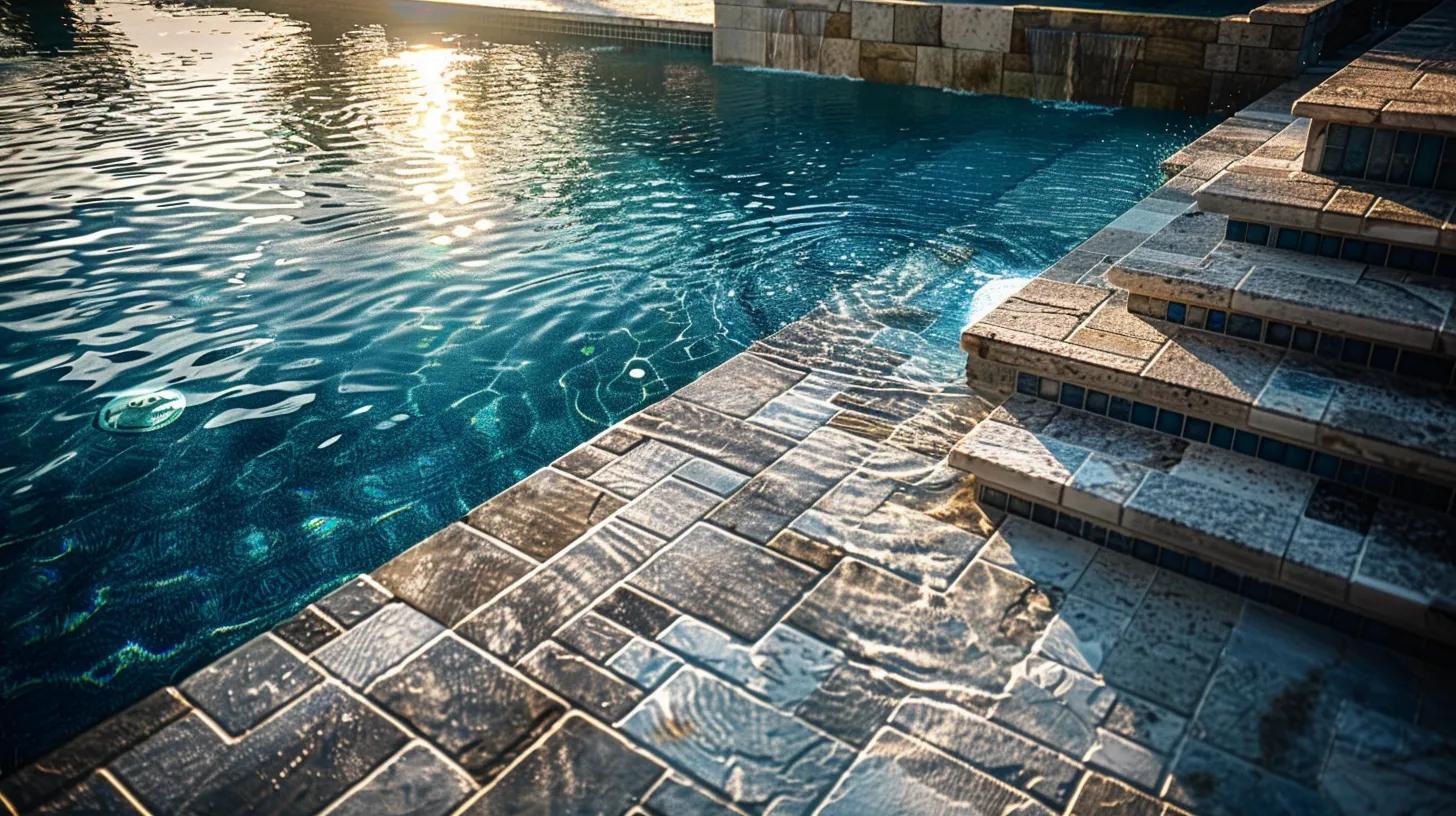
Clearing and preparing pool pavers is essential for optimal cleaning results. Homeowners should begin by removing any debris and loose surface dirt. Use a broom or a leaf blower to clear out leaves and twigs, ensuring that all surface contaminants are eliminated before the deep clean begins. This initial step prevents the redistribution of dirt during later cleaning stages.
Clearing Debris and Surface Dirt From Pool Pavers
Start by manually sweeping or using a leaf blower to clear all loose debris. Removing surface dirt helps in identifying stubborn stains and areas that need pre-treatment. This step minimizes the need for heavy cleaning agents later, preserving the integrity of the paver surface.
Gathering Appropriate Cleaning Tools and Safety Gear
Before starting, collect all necessary cleaning tools such as brushes, buckets, pressure washers (if applicable), and protective gear like gloves and goggles. Using the right equipment ensures safety and avoids damage to both the pavers and the user’s skin. It’s important to work methodically with the correct apparatus to achieve the best results.
Identifying Paver Material for Safe Cleaning Approaches
Pool pavers can be made of natural stone, brick, concrete, or porcelain, among others. Understanding the material type is vital because it determines the cleaning agent and method. For instance, natural stone may require mild detergents and non-abrasive brushes, while concrete pavers can handle more robust cleaning solutions. Correct identification prevents damage such as etching or staining.
Pre-Treating Stubborn Stains on Pool Pavers
Stubborn stains like mold, algae, or oil-based residue need a pre-treatment. Apply a light cleaning agent to these areas and allow it to soak before scrubbing. This helps loosen the dirt, making mechanical cleaning methods more effective while reducing the risk of paver erosion.
Best Cleaning Methods for Different Pool Paver Types
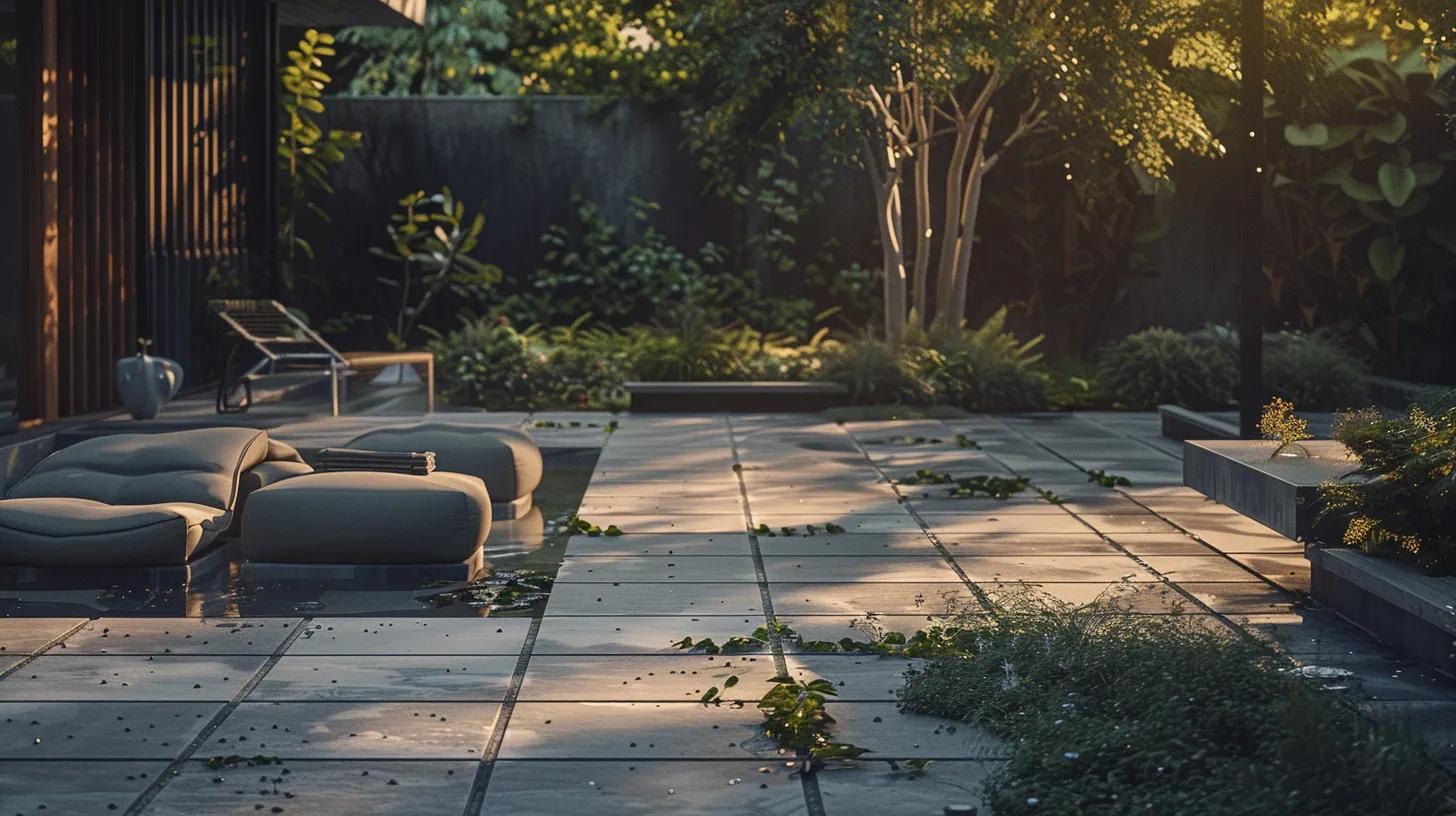
Different paver types demand distinct cleaning methods to achieve a pristine finish without causing damage.
Gentle Cleaning Techniques for Natural Stone Pool Pavers
Natural stone pavers such as travertine or limestone need a gentle touch. Use pH-neutral cleaners and soft-bristled brushes to avoid scratching. A garden hose with moderate water pressure is ideal for rinsing excess cleaner. This method preserves the stone’s natural beauty and prevents deterioration caused by harsh chemicals.
Effective Solutions for Concrete Paver Cleaning
Concrete pavers are durable and can often withstand stronger cleaning agents. Mix a mild detergent with water, and scrub the surface using a stiff brush. Pressure washing can be an option if the nozzle is set to a low-pressure mode to prevent damage. Consistent care helps prevent the development of efflorescence and staining.
Specific Care for Brick Pool Pavers
Brick pavers require a careful approach because they are porous and can absorb cleaning agents. Gentle scrubbing with a soft brush and a mild detergent solution works best. Rinse thoroughly using a hose to ensure no soap residue remains that could cause discoloration over time.
Maintaining Porcelain Pool Pavers With Proper Methods
Porcelain pavers are low maintenance but can be affected by abrasive chemicals. Use a gentle cleaner and a non-abrasive sponge or brush for cleaning. A steady stream of water from a hose provides a safe rinse. This method helps maintain the glossy finish and prevents micro-scratches that could affect appearance.
Manual and Mechanical Pool Paver Cleaning Approaches
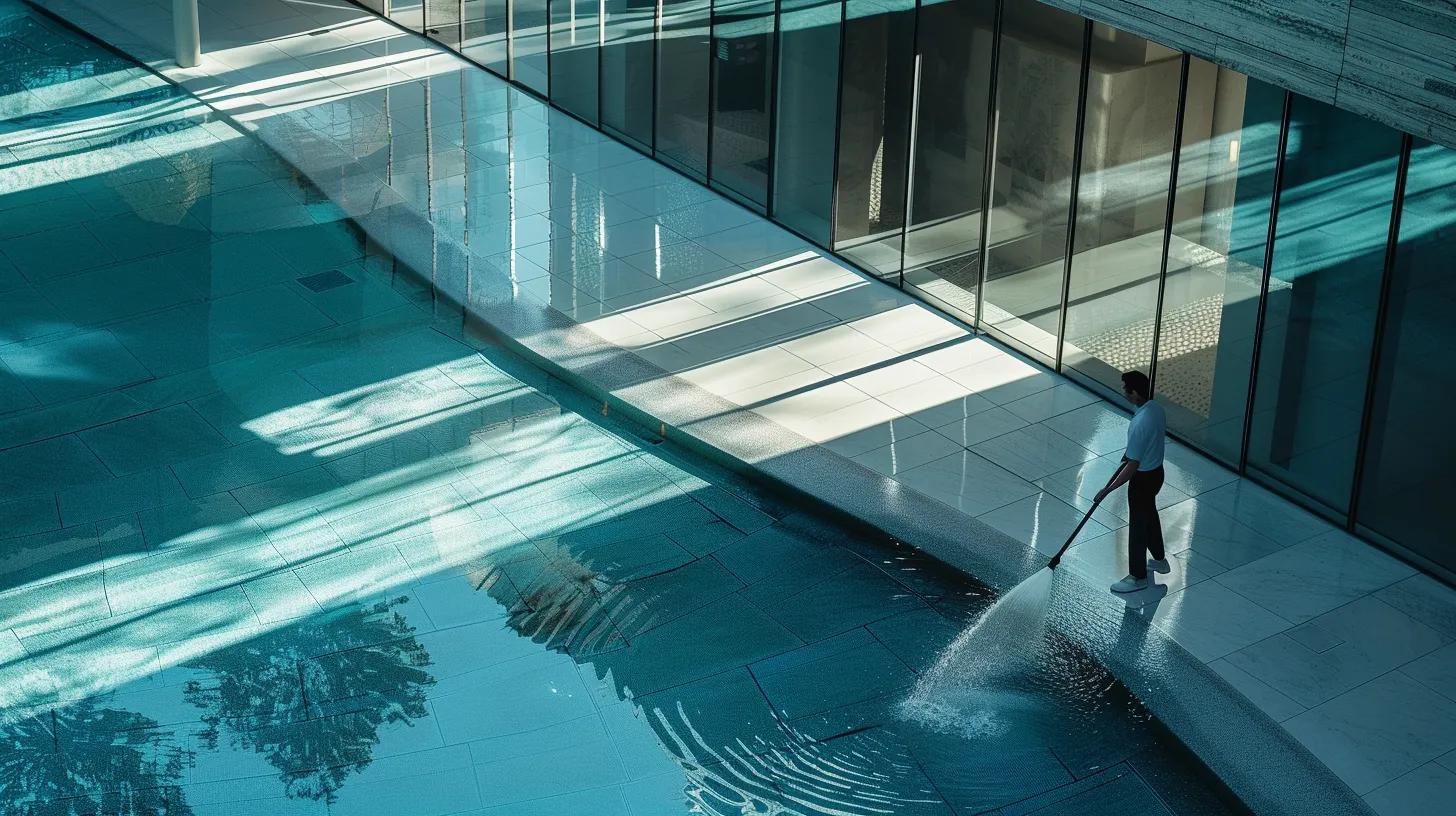
Both manual and mechanical cleaning techniques are effective when applied correctly. Manual cleaning involves using brushes and detergents, which is ideal for small areas or delicate paver materials. Mechanical methods, such as pressure washing, save time and are effective for larger surfaces when used with caution.
Step-by-Step Guide to Scrubbing Pool Pavers
Begin by wetting the surface with water, then apply a cleaning solution made from a mild detergent and water. Use a scrub brush to work the solution into the paver joints and surfaces. Continue scrubbing until visible stains are lifted. Finally, rinse the area thoroughly to remove all cleaning agents, ensuring that no residue remains to attract more dirt.
Utilizing Pressure Washers Safely on Pool Pavers
Pressure washing can clear tough stains in a short time. Always use the appropriate nozzle setting to avoid surface damage. Start with low pressure and gradually increase if needed. For sensitive pavers, maintain a safe distance to prevent chipping or erosion. Safety checks and test spots help adjust pressure settings correctly.
Choosing the Right Nozzles and Pressure Settings
Using the proper nozzle is critical with pressure washers. A fan-shaped nozzle spreads the pressure evenly while preventing focused, damaging bursts. Always consult the pressure washer guidelines recommended for the specific type of paver material. Adjusting settings based on material sensitivity ensures effective cleaning without incurring damage.
Rinsing Procedures for a Spotless Paver Surface
Finish the cleaning process by thoroughly rinsing all pavers. Use a garden hose with a spray nozzle to cover the entire area evenly. Ensure that all detergent or cleaning solution is completely removed to prevent streaking. This final rinse step leaves the pavers looking clean and ready for any post-cleaning treatments.
Tackling Common Stains and Growth on Pool Pavers
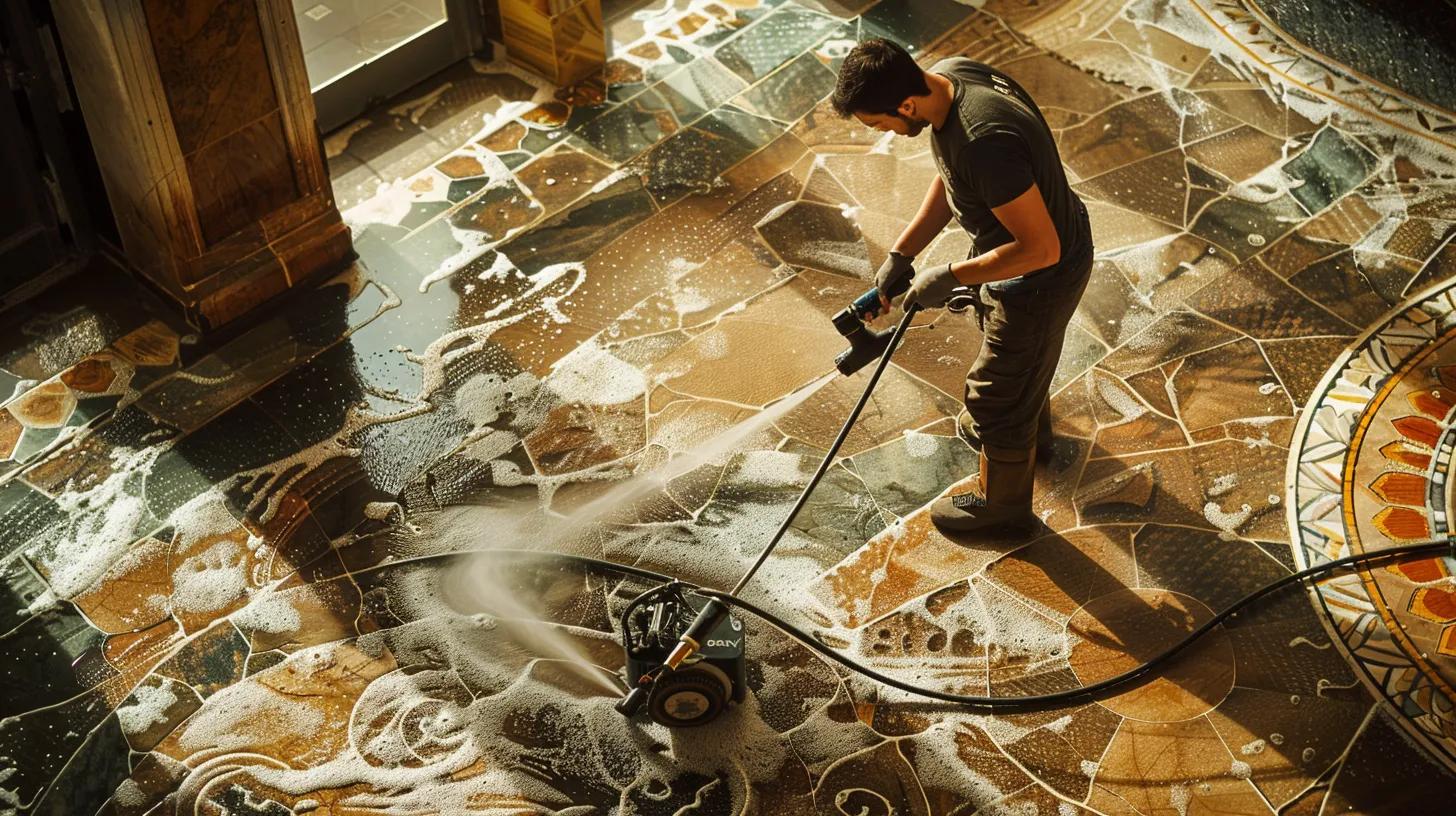
Pool pavers are prone to stains and organic growth, necessitating correct treatment to extend their lifespan.
Removing Algae and Mildew From Pool Paver Surfaces
Algae and mildew can be removed using a diluted bleach solution mixed with water. Apply the solution with a sprayer and gently scrub with a soft brush. Allow the solution to sit for a few minutes before rinsing thoroughly. This method effectively eliminates growth while protecting the paver surface.
Addressing Rust and Mineral Stains on Pavers
Rust and mineral stains require a specific cleaning agent targeted to break down iron or mineral deposits. Use a commercially available rust remover following the manufacturer’s directions. Spot-test the cleaner to ensure it does not affect the paver color or surface integrity before full application.
Best Cleaning Methods for Oil and Grease on Pool Pavers
Oil and grease stains need a degreasing cleaner to break down the contaminants. Apply the cleaner to the stain and let it penetrate before scrubbing with a stiff brush. Rinse off completely to ensure no portion of the degreaser remains. This process helps restore the natural appearance of the pavers.
Preventing Weed Growth in Pool Paver Joints
Regular maintenance is essential to curb weed growth in the joints between pavers. Use a dedicated herbicide or manually remove weeds as soon as they appear. Preventative measures such as sealing the joints once cleaned can also reduce future weed encroachment.
Managing Efflorescence on Pool Pavers
Efflorescence appears as white, powdery deposits and is the result of mineral buildup. It can be managed by using a specialized efflorescence remover and rinsing the surface well. Ensuring proper drainage and regular cleaning can prevent its recurrence.
Eco-Friendly and DIY Pool Paver Cleaning Solutions
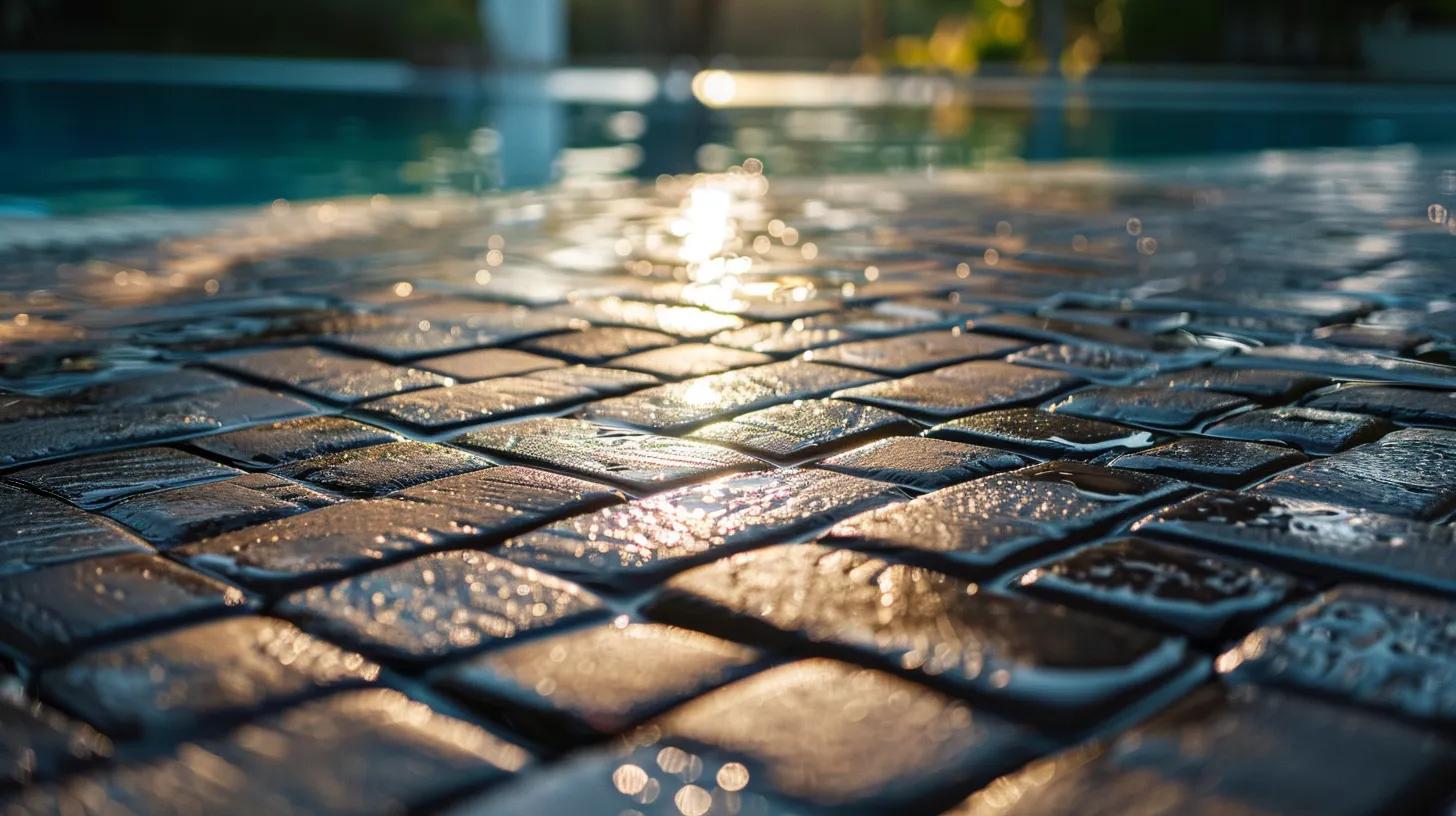
Eco-friendly cleaning methods are ideal for preserving both pool paver integrity and the surrounding landscape.
Crafting Homemade Cleaners for Pool Pavers
Homemade cleaning solutions using common household items like vinegar and baking soda offer a non-toxic alternative to harsh chemicals. Mix equal parts vinegar and water with a sprinkle of baking soda to create an effective cleaner that breaks down organic stains without damaging the pavers.
Using Vinegar and Baking Soda Solutions Safely
Vinegar’s mild acidity dissolves mineral deposits, while baking soda acts as a gentle abrasive. When combined, they create a cleaning paste that effectively removes stains. Apply with a soft brush, allow it to sit briefly, and then rinse thoroughly with water. This eco-friendly solution is safe for many types of paver materials.
Benefits of Biodegradable Paver Cleaning Products
Using biodegradable cleaning agents ensures that harmful chemicals do not seep into the environment. These products are formulated to break down naturally, reducing the risk of environmental harm while still effectively cleaning tough stains. This approach is ideal for eco-conscious homeowners.
Water-Saving Techniques for Cleaning Pool Pavers
Efficient cleaning techniques that minimize water use are critical. Use a hose with a spray nozzle that conserves water while providing enough pressure for rinsing. Collecting and reusing grey water from cleaning processes can further reduce water waste and support environmental sustainability.
Post-Cleaning Care and Maintenance for Lasting Results
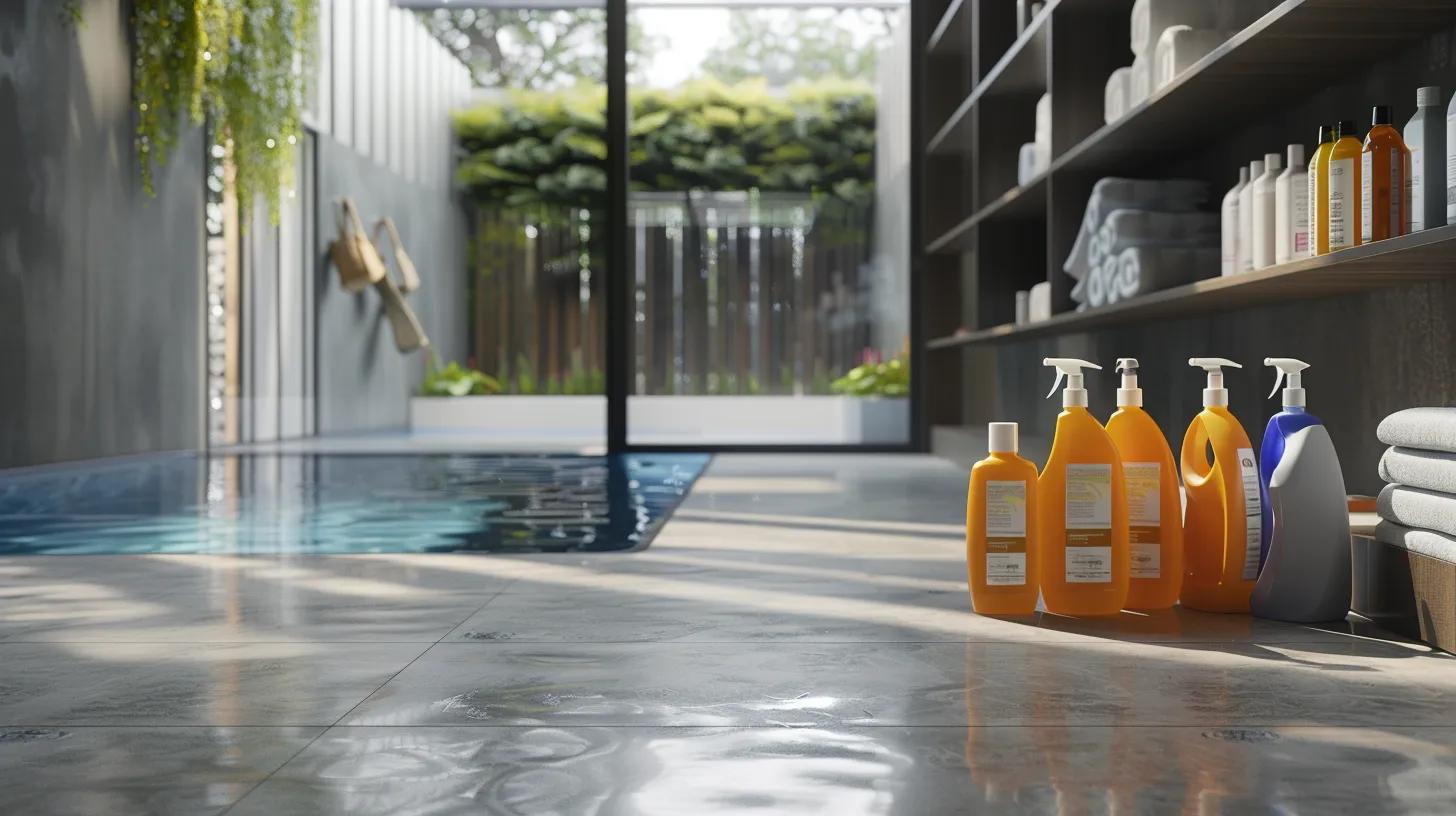
After cleaning, proper post-care ensures that pool pavers remain in optimal condition for a longer period.
Importance of Thoroughly Drying Pool Pavers
Allowing pool pavers to dry completely after cleaning prevents the rapid growth of algae and mold. Drying can be achieved through natural sunlight or using fans to circulate air over the surface. This step is crucial to avoid the trapping of moisture between pavers.
Applying Sealant to Protect Cleaned Pool Pavers
Once the pavers are dry, applying a quality sealant helps protect them from future stains and environmental wear. Sealants provide a barrier against moisture, debris, and prolonged exposure to cleaning chemicals. Regular resealing is recommended to maintain durability and appearance.
Establishing a Regular Pool Paver Cleaning Schedule
A routine cleaning schedule prevents buildup of dirt and stains. Homeowners should plan to clean their pool pavers every few months depending on usage and environmental factors. Regular inspection and cleaning not only keep pavers looking new but also extend their lifespan.
Knowing When to Call Professional Pool Paver Cleaners
Some situations may require professional intervention, especially if stains are severe or paver damage is suspected. Licensed and insured professionals have the experience and equipment necessary to safely restore your pool area. Consulting experts periodically can ensure your pavers remain in top condition.
Common Pool Paver Cleaning Mistakes to Avoid
Avoid using harsh chemicals or abrasive tools that can damage the surface. Rushing the process or neglecting pre-treatment steps can lead to uneven cleaning. Proper planning, the right tools, and methodical execution are key to effective pool paver maintenance.
Final Thoughts
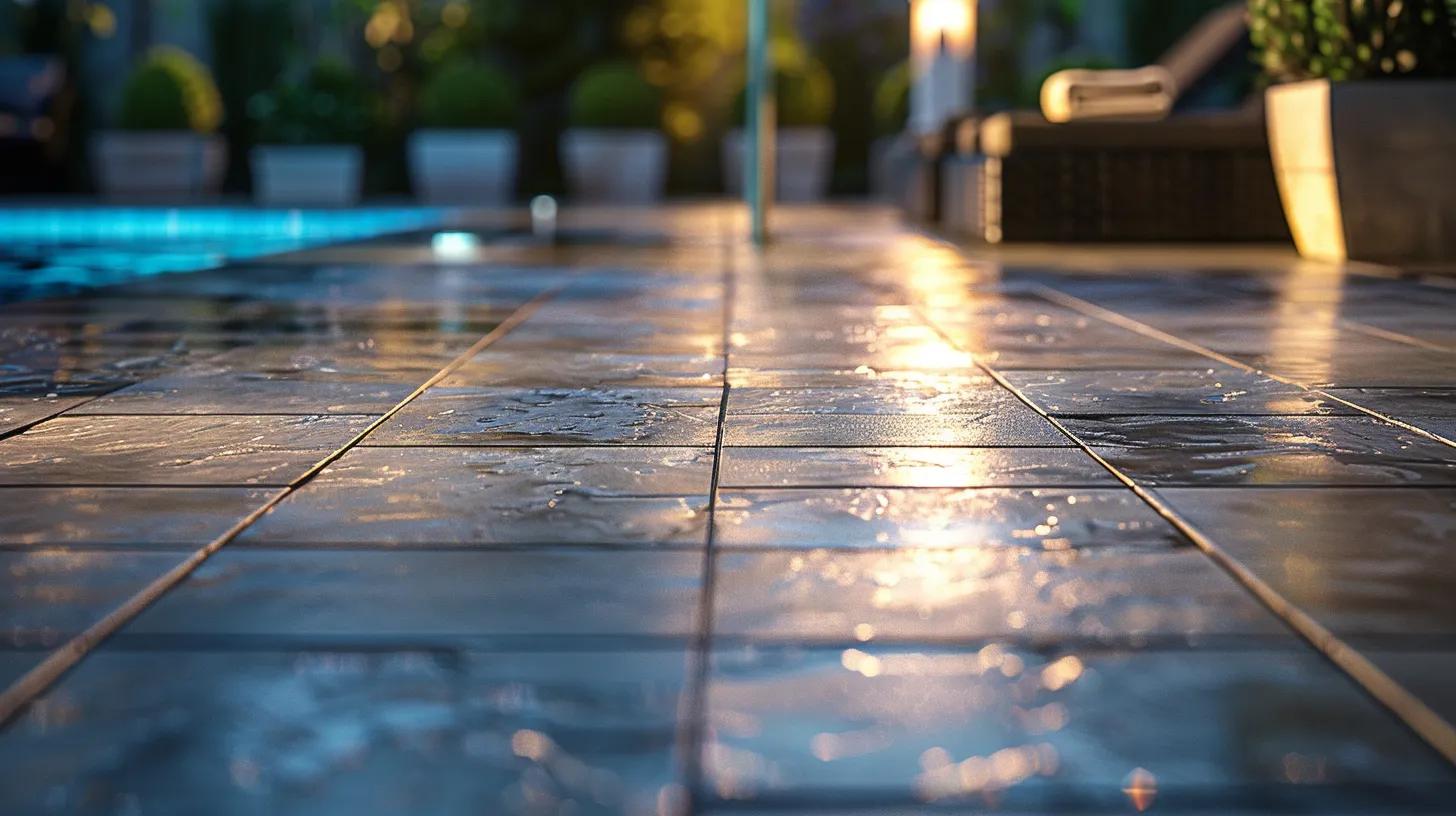
In conclusion, effective pool paver cleaning begins with thorough preparation and an understanding of paver materials. By selecting appropriate cleaning methods for each paver type and following both manual and mechanical approaches, homeowners can maintain a pristine pool area. Eco-friendly solutions and regular maintenance further ensure lasting results and reduce environmental impact. Ultimately, a methodical cleaning routine protects your investment and enhances the overall appearance of your outdoor space.
Frequently Asked Questions
Q: How often should pool pavers be cleaned?
A: It is recommended to clean pool pavers every few months, or as needed based on usage and environmental conditions, to prevent buildup and ensure longevity.
Q: Can I use a pressure washer on natural stone pavers?
A: Yes, but use a low-pressure setting with a fan nozzle and maintain a safe distance to avoid damaging the porous surface of natural stone.
Q: What eco-friendly cleaning options are available for pool pavers?
A: Homemade solutions like a vinegar and baking soda mix or biodegradable cleaning products are effective and environmentally safe alternatives to harsh chemicals.
